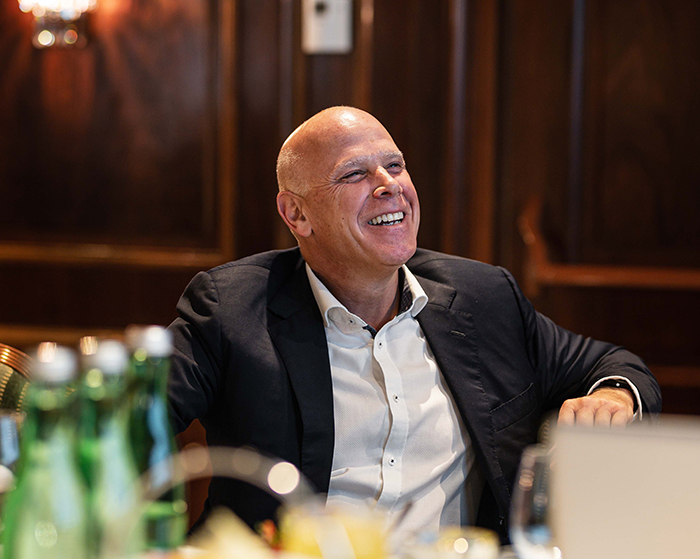Carrying the Global Banner: Meet Brian Ruszczyk '88

Alum pivots from international finance to global food tech
by MaryAlice Bitts-Jackson
Global education, sustainability and lifelong learning are more than mere catchphrases to Brian Ruszczyk ’88. Decades into his globe-trotting career in banking and wealth management, he pivoted to the alt-protein sector. And as he helps to make the world a more sustainable and equitable place through new food technologies, he’s passing along lessons learned to a current Dickinson student.
An international view
The son of a teacher, Ruszczyk caught the travel bug as a high-school exchange student to Chile. A strong global program drew him to Dickinson, where he declared a double major in Spanish & Portuguese and interntaional relations, worked as a teaching assistant and studied abroad in Chile.
For two years after graduation, Ruszczyk taught Spanish and Latin American history at a private school in Sedona, Arizona. Teaching, he realized, wasn’t a perfect fit.
So in 1990, he entered grad school at Johns Hopkins University SAIS with passions for finance, economics, Latin American studies and international relations. Those interests and skill sets—including his fluency in Spanish and Portuguese—prepared him well for a job interview with a recruiter from Chase Manhattan Bank in the Latin American division.
Engaging the world of finance
In the years since, Ruszczyk has lived and worked around the world, with trips that include occasional visits with his Dickinson advisor, Professor Emerita Grace Jarvis, in Málaga, Spain.
Working with Chase Manhattan Bank (later, J.P. Morgan), Ruszczyk lived in Mexico City; NYC; Sao Paulo, Brazil; and Santiago, Chile. Then he moved to Geneva, where he led the Latin American division of the Swiss arm of J.P. Morgan. After years at that helm, he ran Deutsche Bank’s private-wealth divisions in Greece and Turkey and sat in on the Deutsche Shipping Committee in Hamburg.
Three decades in and ready for change, Ruszczyk established a private company advising wealthy families. After working with a client on sustainable-food investments, he and a business partner created Earth First Food Ventures in 2020.
Pivot to alt-proteins
Earth First Food Ventures supports the development of sustainable-protein alternatives to meat through breakthroughs in cell-agriculture technology, precision-fermentation processes and other synthetic biology plant-based techniques. The aim is to provide the world with healthy, sustainable, accessible, protein-packed food.
“The trick is to inspire the consumer to transition from one protein source to another,” says Ruszczyk. That needle is moving. The USDA recently approved two cultivated meat companies—created by reproducing animal cells in the lab. And so Earth First Food Ventures is building a land-based salmon-production site in the U.S., as well as in France, where Ruszczyk now lives, for human consumption.
Giving back
Last January, Ruszczyk hosted a Dickinson intern with a familiar academic background. Like Ruszczyk before him, Zach Pearce '25 majors in international relations; he also minors in Spanish.
Working with Earth First leaders from around the world, Pearce updated data sets and contributed to pitch decks, memos and the company’s social media marketing. It went so well that Ruszczyk extended the internship through the summer. After a fall semester in Bologna, Pearce may continue his internship next spring.
“It motivates me, knowing that Brian is so successful, and that his journey began at Dickinson,” Pearce says. “I get a large sense of pride in our school, getting to witness firsthand how hard he works to scale a business and a cause that holds true to his beliefs. It reaffirms my desire to do the same for Dickinson students later in my life and professional career.”
Ruszczyk also gives back to the world beyond Dickinson. After the breakout of the Ukraine-Russia war, he established a foundation to help displaced Ukrainians. The foundation has hosted 120 refugee families as of this writing, and Ruszczyk has thus far hosted 15 individuals in his home. He sees this work as an act of global citizenship—an ethos that inspired him as a student and continues to guide him forward.
“It’s so important for those of us who are interested in international relations to carry that banner—to integrate the values of global citizenship, freedom of speech and liberal democracy,” Ruszczyk says. “It’s something I’ve been passionate about all throughout my life.”
TAKE THE NEXT STEPS
Published August 2, 2023